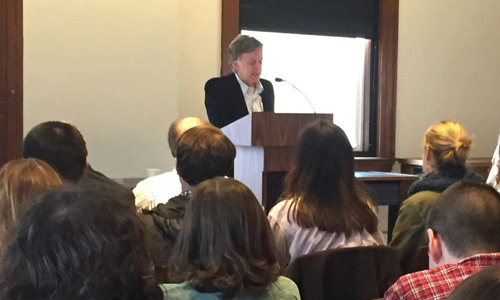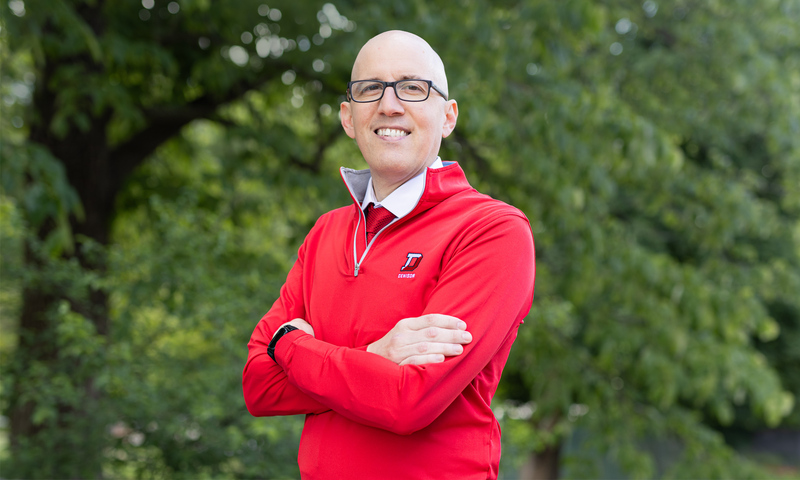When I met Ted Conover, he was beaming, shaking hands and scrawling autographs at the end of Professor Dennis Read’s class, “Literature of Travel.” Ted Conover, 57, an award winning immersive journalist who has written five books came to Denison on March 27 as the latest writer in the Beck Series. Conover, who has documented the wealthy in Aspen, prison guards in Sing Sing and an Atlanta “snitch,” has an unquestionable appreciation for the non-fiction genre. “You want [your subjects] to recognize themselves,” he explained to me over lunch in Huffman Dining Hall. “Listen carefully, try to be empathetic, and make it your objective to see the world through their eyes as far as you can,” he advised.
When Conover, a Colorado native, decided that he was going to delay his final semester at prestigious Amherst College to ride freight rails with hoboes, his parents were “surprisingly supportive.” Looking back, Conover said he wasn’t afraid himself “because bad luck can happen to any of us.” The trip was more calculated and less about the whims of a college senior than one might expect. Conover had made the topic his senior thesis, wrote about it in an alumni magazine, and was contacted by the Associated Press via an alum who had read his article. After the AP call, Conover remembers, he was able to secure a book advance and publicity on NPR’s All Things Considered and the Today Show. I told Conover that the progression seemed a bit like a fairytale - a series of fortunate events and lucky turns. He shrugged and said, “It was luck I made.”
Three years ago, Conover published a piece in New York Times Magazine about an Atlanta drug dealer, Alex White, forced to walk a tightrope between the gritty streets and being an involuntary “snitch” for the Drug Enforcement Agency. Conover visited White over the course of 15 months, documenting the brutal tactics of drug agents and White’s immense hope for a better life.
“You can make your subjects your teachers,” Conover said of non-fiction writing’s anthropologic effect.
“What did Alex White teach you?” I asked.
A pause. “It’s possible to build a new life after your mistakes; it’s hard to do the right thing; he reminded me how important loyalty is.”
As an immersive journalist and memoirist, Conover has had the ability to write about a number of diverse circumstances in diverse manners. As a NYU professor, Conover gets to share those experiences and abilities every week with a class of twenty students. He said there are two mistakes that young writers make. “To be self consciously literary,” he said, “to try really hard to sound literary, it doesn’t work.” He added that people can’t wait to be inspired: “You can’t sit at a blank computer screen and not know what to say,” he explained. “I try to think of my beginning, my ideas.”
While Conover has lived an exciting life, he says that there are some things he wouldn’t do now and some things he would never do. One of them is war reporting, which he and his wife agree is off limits. “I wouldn’t be a rookie police officer [like at Sing Sing],” he said with a chuckle. “I’d be slow to recover.” Conover said that as he’s gotten older, he’s become less risk averse: “I have a keener sense of my own mortality now than when I was younger. When I was young I didn’t have anyone to depend on me,” he reflects, talking about his wife and children.
By the end of our conversation, Ted Conover had one last piece of advice: “Spend time with people who make you want to write.” After he landed in the airport in Columbus, he searched for a taxi to make the forty minute drive to Granville. His driver ended up being an African immigrant who lost one of his legs fighting as a rebel against his native country’s oppressive regime. Conover said he learned a lot from that conversation. “I love life, I love being able to…” he trailed off then, and cocked his head to the side. “You just have to pay attention. There’s interesting people all around us.”

